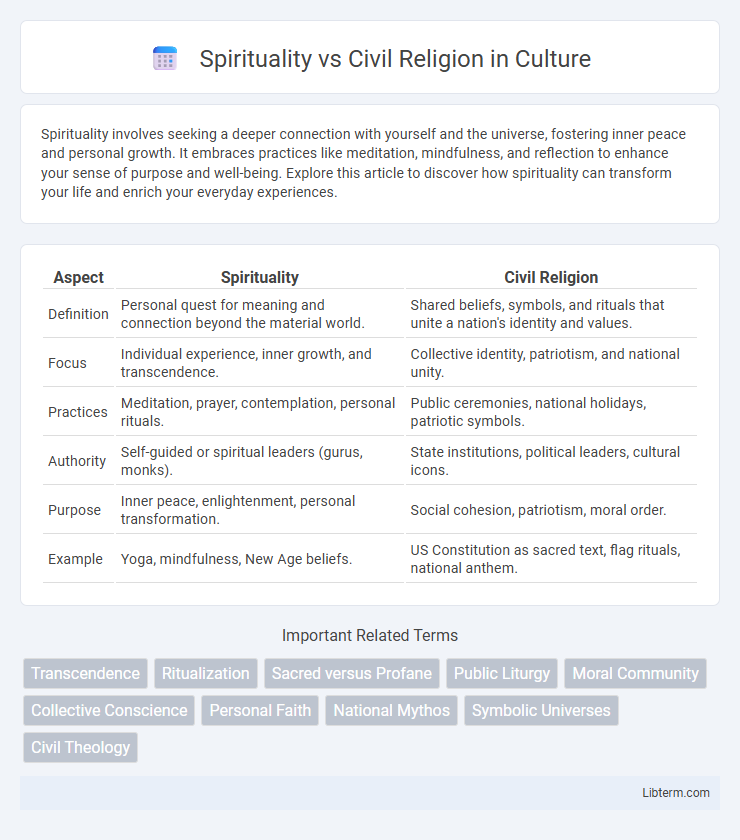Spirituality involves seeking a deeper connection with yourself and the universe, fostering inner peace and personal growth. It embraces practices like meditation, mindfulness, and reflection to enhance your sense of purpose and well-being. Explore this article to discover how spirituality can transform your life and enrich your everyday experiences.
Table of Comparison
| Aspect | Spirituality | Civil Religion |
|---|---|---|
| Definition | Personal quest for meaning and connection beyond the material world. | Shared beliefs, symbols, and rituals that unite a nation's identity and values. |
| Focus | Individual experience, inner growth, and transcendence. | Collective identity, patriotism, and national unity. |
| Practices | Meditation, prayer, contemplation, personal rituals. | Public ceremonies, national holidays, patriotic symbols. |
| Authority | Self-guided or spiritual leaders (gurus, monks). | State institutions, political leaders, cultural icons. |
| Purpose | Inner peace, enlightenment, personal transformation. | Social cohesion, patriotism, moral order. |
| Example | Yoga, mindfulness, New Age beliefs. | US Constitution as sacred text, flag rituals, national anthem. |
Defining Spirituality and Civil Religion
Spirituality involves a personal quest for meaning, connection, and transcendence often centered on inner experiences and individual beliefs. Civil religion refers to the shared set of beliefs, symbols, and rituals that provide a collective national identity and moral framework outside organized religion. Defining these concepts highlights spirituality's emphasis on subjective, internal growth versus civil religion's focus on public, societal cohesion through common values.
Historical Roots of Civil Religion
Civil religion emerged during the American Revolution as a unifying national ideology blending political values with sacred symbols, rituals, and myths to foster social cohesion. Rooted in the Enlightenment's emphasis on reason and republican virtues, it integrates references to a divine providence guiding the nation's destiny, distinct from personal spirituality or organized religion. This historical foundation reflects the effort to create a collective identity that transcends individual faiths while maintaining a shared moral framework supporting governance and patriotism.
Core Beliefs: Personal Faith vs Collective Practice
Spirituality centers on personal faith, emphasizing an individual's direct relationship with the divine, inner peace, and personal growth. Civil religion involves collective practice, uniting members of a society through shared sacred symbols, rituals, and national myths that reinforce social cohesion and cultural identity. This core distinction highlights spirituality's subjective experience versus civil religion's role in fostering communal bonds.
Rituals and Symbols: Sacred vs Secular
Rituals in spirituality often emphasize personal transformation and connection to the sacred, featuring symbols like prayer beads, altars, and sacred texts that evoke divine presence and transcendence. Civil religion rituals, such as national ceremonies, flag salutes, and patriotic holidays, utilize secular symbols that foster unity and collective identity without necessarily invoking supernatural elements. These contrasting practices highlight how sacred rituals seek intimate spiritual experiences, while secular rituals reinforce social cohesion and national values through shared symbolism.
The Role of Community in Spirituality and Civil Religion
Community in spirituality fosters personal growth and shared transcendental experiences through intimate rituals and collective worship. Civil religion unites citizens by embedding sacred symbols and collective narratives within national identity, reinforcing social cohesion and patriotism. Both frameworks rely on communal participation to sustain belief systems and provide individuals with a sense of belonging and purpose.
Influence on National Identity
Spirituality influences national identity by fostering personal and collective values rooted in individual beliefs and transcendent experiences, shaping cultural narratives and moral frameworks uniquely. Civil religion, characterized by shared rituals, symbols, and myths aligned with state ideology, unifies citizens through common patriotic and ethical commitments that reinforce social cohesion. Both forms impact national identity deeply, with spirituality offering diverse personal meaning and civil religion promoting collective unity and loyalty to the nation-state.
Authority and Leadership Structures
Spirituality emphasizes personal authority and individual leadership, encouraging self-discovery and inner guidance without centralized control, while civil religion relies on structured hierarchies and institutionalized leadership to maintain social order and collective identity. In civil religion, authority is often vested in governmental or religious institutions that dictate rituals, symbols, and moral codes to unify followers under a common civic framework. Spiritual leadership typically manifests through charismatic figures or informal communities, prioritizing personal transformation over institutional allegiance.
Spirituality, Civil Religion, and Social Cohesion
Spirituality emphasizes personal, inward experiences and individual connection to the sacred, fostering a sense of meaning and purpose beyond formal institutions. Civil religion refers to shared public beliefs, symbols, and rituals that unify a society, often linked to national identity and collective values. While spirituality nurtures personal growth and inner peace, civil religion reinforces social cohesion by providing common ground for collective identity and communal solidarity.
Tensions and Overlaps Between the Two
Spirituality emphasizes personal, inward experiences of the sacred, while civil religion manifests through public rituals and national symbols that foster collective identity. Tensions arise when individual spiritual beliefs challenge or diverge from the homogenizing narratives of civil religion, leading to contestations over meaning and authority. Overlaps occur as both systems utilize shared symbols and values, blending personal faith with civic loyalty to create a sense of belonging and moral order.
Future Trends in Spirituality and Civil Religion
Future trends in spirituality indicate a growing emphasis on personalized, experiential practices driven by technology and social media platforms, enabling broader access and diverse expressions beyond traditional institutional frameworks. Civil religion is likely to evolve through increased integration with national identity and public rituals, adapting to multicultural societies while maintaining symbolic cohesion and shared values. The intersection of spirituality and civil religion may foster hybrid forms that blend individual meaning-making with collective narratives, shaping societal cohesion in the 21st century.
Spirituality Infographic

 libterm.com
libterm.com